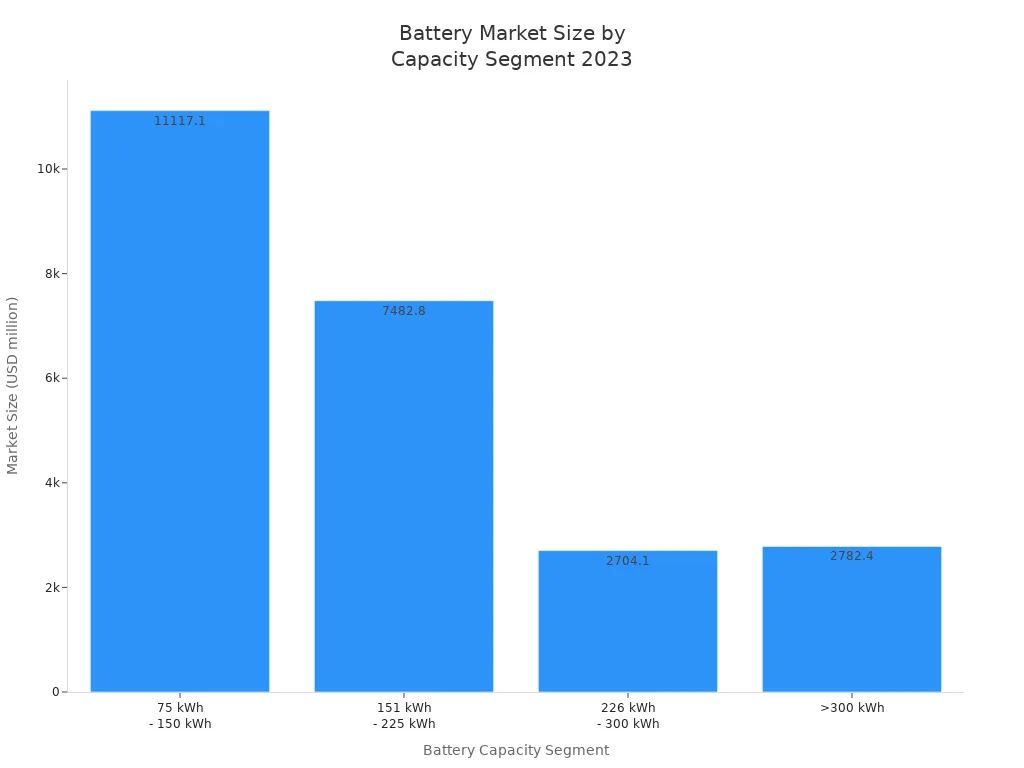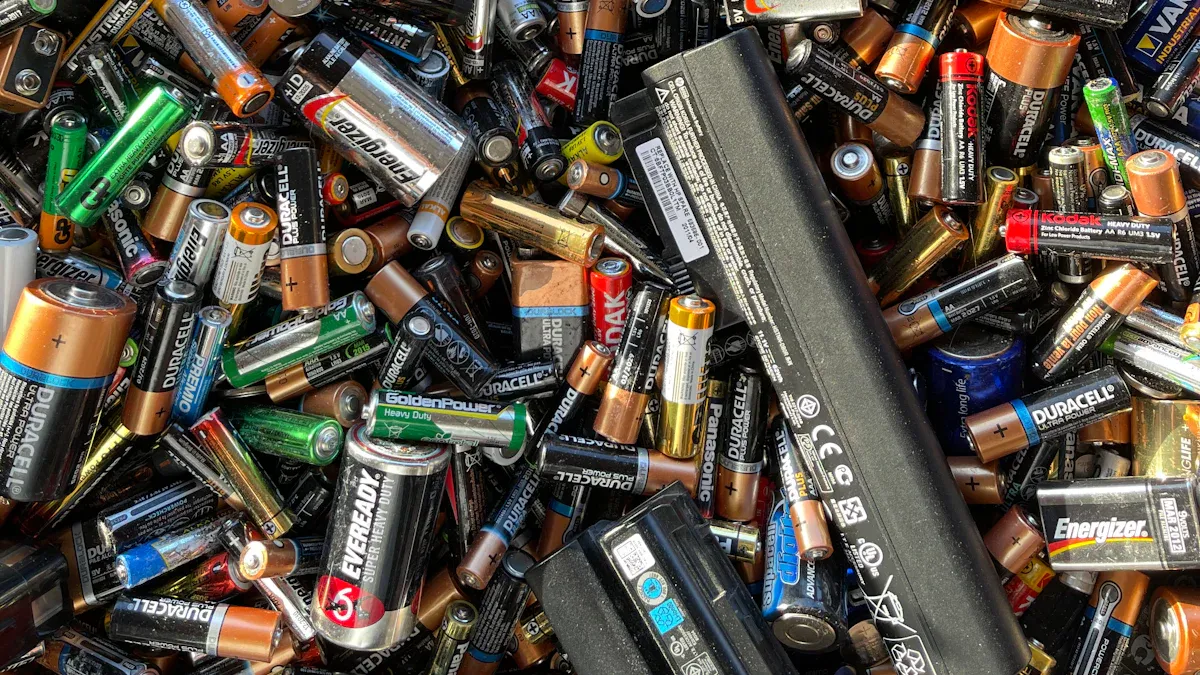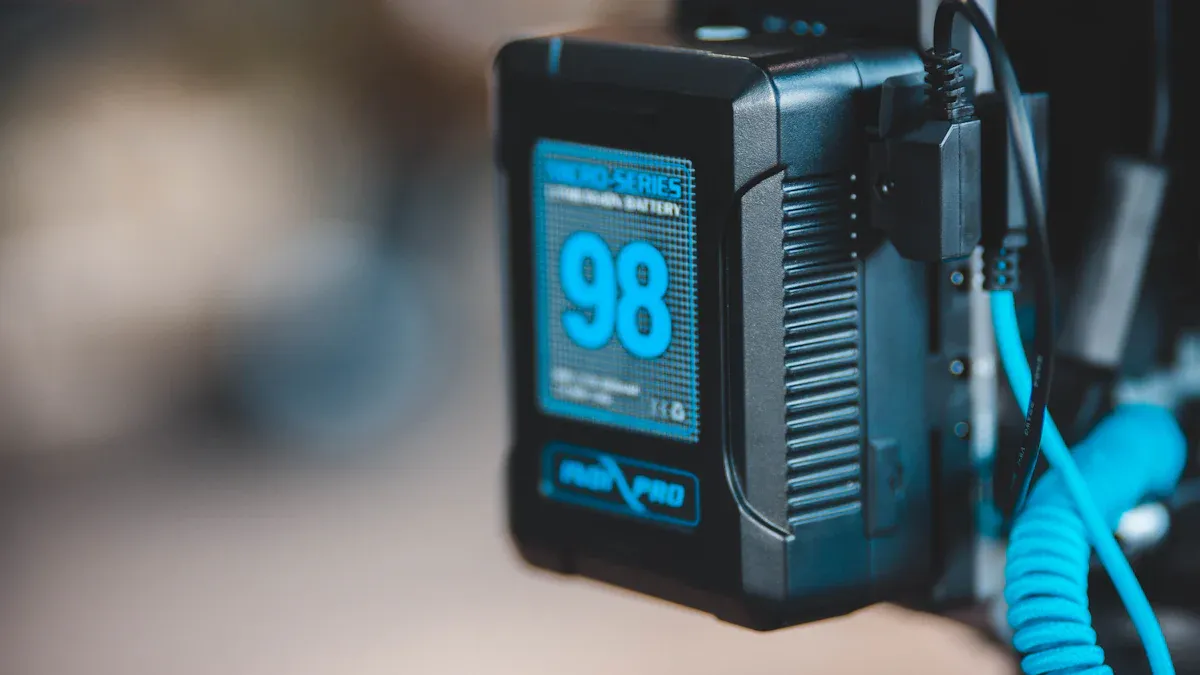
When you need longer runtime for your devices, high capacity batteries work best. If your application demands strong power delivery or fast charging, high voltage batteries offer better performance. You should look at several factors before choosing a battery: runtime, power, efficiency, safety, cost, and compatibility. Market data shows high voltage batteries, especially in the 400-600V range, lead in electric vehicles and industrial use.

Think about your energy and power needs, system setup, and installation environment. Picking the right battery depends on your specific requirements.
快速比较
主要区别
You need to know how high capacity batteries and high voltage batteries compare before you choose one for your solar or energy storage system. The table below shows the main differences in efficiency, safety, cost, compatibility, and best uses:
| 方面 | High Capacity Batteries (Low Voltage) | High Voltage Batteries |
|---|---|---|
| 效率 | Lower (90-93%); more energy loss | Higher (94-97%); less energy loss |
| 安全 | Safer; lower shock risk; easier for DIY | Higher shock risk; certified installer needed |
| Installation | Simple; lower labor cost | Complex; higher labor and compliance cost |
| 费用 | Lower upfront and installation cost | Higher battery and installation cost |
| 兼容性 | Works with most home solar inverters | Limited inverter support; best for large systems |
| Ideal Use | Home backup, RV, small solar, DIY | Commercial, large homes, EV charging, big solar |
High voltage batteries use advanced battery management systems. These systems help keep the battery safe and efficient by watching voltage, temperature, and current. High voltage systems also need special cooling to prevent overheating. High capacity batteries are easier to install and safer for home use.
Use Cases
You should match the battery type to your application. Here are some common scenarios:
- For home backup and small solar applications, high capacity batteries work best. They are easy to install and safe for most homes.
- If you use power tools or need battery storage for RVs or tiny homes, choose high capacity batteries. They are DIY-friendly and cost less.
- For large solar energy storage, commercial solar, or EV charging, high voltage batteries give you better performance and power. They handle bigger loads and work well with advanced solar systems.
- In commercial solar applications, lithium-ion batteries are the top choice. They last longer, need less maintenance, and store more energy in less space.
Tip: Always check if your inverter supports the battery voltage you choose. This helps you avoid problems with compatibility and safety.
Types of Batteries

High Capacity Batteries
You will find high capacity batteries in many devices that need long-lasting power. These batteries store a large amount of energy, so they can run devices for a long time without recharging. You often see them in home backup systems, RVs, and solar energy storage for homes. They also power laptops, smartphones, and other electronics that need steady energy.
Here is a table showing typical voltage and capacity ranges for high capacity batteries:
| 电池类型 | Voltage Range (Volts) | 容量范围 | Examples |
|---|---|---|---|
| High Capacity Batteries | 不适用 | 10 kWh to 100 kWh (commercial/home) | Lithium-ion: 48V 100Ah, 48V 200Ah |
You can use high capacity batteries in:
- Home backup systems and residential solar energy storage
- RVs and off-grid cabins
- Laptops, smartphones, and tablets
- Power tools that need steady, long-lasting energy
Recent advances in high capacity battery design include 锂硫电池, which offer double the energy density of regular lithium-ion batteries. Graphene-enhanced batteries now charge faster and last longer. Solid-state batteries also improve safety and performance for solar applications and grid-scale energy storage.
Note: Brands like Tesla (Powerwall), LG Chem, and Sonnen lead the market for home backup and solar energy storage batteries.
High Voltage Batteries
High voltage batteries deliver strong power and support fast charging. You will see these batteries in electric vehicles, commercial and industrial energy systems, and large solar installations. They work well in places that need quick bursts of energy or high performance.
Here is a table showing typical voltage ranges for high voltage batteries:
| 电池类型 | Voltage Range (Volts) | Common Voltages | Examples |
|---|---|---|---|
| High Voltage Batteries | 200 V to 800 V (EVs), >1000 V (grid-scale) | 400V, 500V, 600V, 750V, 800V | Electric vehicles, solar farms |
You will find high voltage batteries in:
- Electric vehicles and buses (improving electric vehicle performance)
- Commercial solar energy storage and grid-scale energy storage
- Power tools, electric bikes, and medical devices
- Construction and agriculture equipment
Recent advancements in high voltage battery design include 800-volt systems in electric vehicles. These systems charge faster and improve efficiency. Solid-state batteries and lithium iron phosphate batteries now offer better safety and longer life. Companies like Microvast have developed all-solid-state batteries that work at higher voltages, making them safer and more efficient for solar and industrial use.
Tip: High voltage batteries need certified installers because of the higher shock risk. Always check compatibility with your solar inverter before installation.
关键因素

Energy Needs
You should always start by thinking about your energy needs. Different devices and solar systems require different types of batteries. For example:
- Devices like remote controls, smoke detectors, laptops, and smartphones need batteries that provide steady, long-lasting energy. High-capacity batteries work best for these because they deliver energy slowly and safely.
- Power tools, electric cars, and some medical devices need quick bursts of power. High voltage batteries are designed for these high-performance uses. They can deliver strong power quickly, which is important for solar and electric vehicle systems.
- The choice between high capacity and high voltage depends on how much energy your device uses and how fast it needs that energy. You must also consider the trade-offs, such as lifespan, safety, and cost.
System Compatibility
Before you install battery storage in your solar setup, check if your inverter and charger match the battery type. Follow these steps:
- Check the inverter’s voltage and charging algorithm. Make sure they work with your battery.
- Update firmware or add new parts if needed for proper integration.
- Always follow safe installation practices to avoid hazards.
- High voltage batteries need advanced battery management systems (BMS) for real-time monitoring and safety.
- Sometimes, you may need to upgrade wiring or connectors to handle higher power and charging and discharging rates.
- Ask a professional for help if you are unsure about compatibility.
Installation & Safety
Safety is very important when working with batteries, especially in solar and energy storage systems. High-capacity batteries can overheat and cause fires if not managed well. This is called 热失控. High voltage batteries have a higher risk of electric shock. Always:
- Follow the manufacturer’s instructions for charging and discharging rates.
- Keep batteries cool and dry.
- Inspect batteries often for damage.
- Use protective gear when handling batteries.
- Never try to repair high voltage batteries yourself.
Tip: Only certified installers should handle high voltage battery storage for solar systems.
Cost & Maintenance
"(《世界人权宣言》) cost of batteries depends on their type and size. Here is a simple table to compare:
| 方面 | High-Capacity Batteries | High Voltage Batteries |
|---|---|---|
| Upfront Costs | 更高 | 较低 |
| Long-Term Costs | Lower (lasts longer) | Higher (needs more replacements) |
| 维护 | Careful management needed | Needs careful handling |
| 寿命 | Longer | Shorter |
High-capacity batteries usually last longer and need fewer replacements. High voltage batteries may cost less at first but need more maintenance and have a shorter lifespan. Always consider both the upfront and long-term costs when choosing batteries for your solar energy storage system.
Choosing the Right Batteries
When to Choose High Capacity
You should choose high capacity batteries when your main goal is long runtime and steady energy output. These batteries work best in solar energy storage for homes, off-grid cabins, and backup systems. If you want your devices to last longer between charges, high capacity batteries give you more hours of use. For example, in off-grid solar applications, you need batteries that store enough energy to power your home during cloudy days or at night. High capacity batteries help you avoid frequent recharging and support devices that need steady power, like laptops, tablets, and medical equipment.
Here are some situations where high capacity batteries are the best choice:
- Off-grid solar systems that need to store energy for nighttime or cloudy days
- Home backup systems where you want long-lasting power during outages
- RVs, boats, and remote cabins that rely on solar energy storage
- Portable devices and tools that need extended operation without frequent charging
High capacity batteries offer several advantages:
- They provide longer runtime, so you do not need to recharge as often.
- Their 高能量密度 means they last longer on a single charge.
- They have a lower self-discharge rate, so they keep their charge when not in use.
- They support many charge and discharge cycles, which increases their lifespan.
- Their lighter weight and smaller size make them ideal for portable solar applications.
When you select batteries for off-grid solar, consider these important factors:
- Battery capacity and efficiency: Make sure your battery can store enough energy and charge efficiently.
- Depth of discharge: Choose batteries that allow deeper discharges without damage.
- Cycle life: Look for batteries with a high number of charge/discharge cycles.
- Temperature performance: Pick batteries that work well in your climate.
- Maintenance needs: Lithium batteries require less maintenance, which is helpful for remote locations.
- Compatibility: Ensure your batteries work with your solar charge controllers and inverters.
Tip: High capacity batteries are safer and easier to install, making them a good choice for DIY solar projects and small-scale energy storage.
When to Choose High Voltage
You should choose high voltage batteries when your application needs high power, 快速充电, or supports large-scale solar systems. High voltage batteries deliver strong bursts of energy and maintain stable voltage under heavy loads. These batteries are ideal for high power applications, such as electric vehicles, commercial solar installations, and industrial energy storage.
Here are some scenarios where high voltage batteries are the best fit:
- Large solar farms and commercial solar energy storage systems
- Electric vehicles and EV charging stations that need rapid charging and high power output
- Industrial backup power systems that require quick response and high efficiency
- Power tools and emergency equipment that need instant energy delivery
High voltage batteries provide several key benefits:
- They support faster charging and discharging rates, reducing downtime.
- Their high power density ensures stable performance under heavy loads.
- They use advanced battery management systems for safety and efficiency.
- They require smaller conductors, which reduces heat loss and improves efficiency.
- They are more energy dense, making them suitable for large-scale solar applications.
| 方面 | High Voltage Batteries (HV) | High Capacity Batteries (Low Voltage, LV) |
|---|---|---|
| Voltage Range | Typically 300-500V | Typically under 100V (e.g., 12V, 24V, 48V) |
| Current & Heat Loss | Lower current for same power, less heat loss, higher efficiency | Higher current needed, more heat loss due to resistance |
| 效率 | More efficient for high output and long duration backup power | Less efficient under heavy loads due to higher current losses |
| Power Delivery | Suitable for industrial, commercial, EV charging, large solar | Suitable for residential, small-scale, off-grid backup power |
| Installation Complexity | Requires professional installation, advanced safety measures | Easier installation, safer, DIY-friendly |
| 费用 | Higher cost due to insulation, circuit protection, inverters | More affordable, lower component costs |
| 安全 | Higher risk of electric hazards, needs advanced protection | Safer with lower risk of electric shock |
| 典型应用 | Large backup power systems, EV stations, industrial storage | Residential solar storage, small commercial, off-grid systems |
High voltage batteries excel in high power applications because they deliver quick bursts of energy and enable fast charging. You will see these batteries in electric vehicles, solar farms, and commercial solar energy storage. They also support advanced safety features, such as high voltage interlocks and battery management systems, to protect against electrical faults.
Note: Only certified professionals should install high voltage batteries due to the higher risk of electric shock and the need for advanced safety measures.
Common Mistakes and How to Avoid Them
Many people make mistakes when choosing between high capacity and high voltage batteries. You can avoid these errors by following a simple checklist:
- Assess your device’s energy and power needs. Do you need long runtime or quick bursts of energy?
- Match the battery type to your application. Use high capacity batteries for long-lasting power and high voltage batteries for high power and fast charging.
- Check compatibility with your solar inverter and other system components.
- Prioritize safety. Choose batteries from reputable brands and follow installation guidelines.
- Consider the trade-offs between capacity, voltage, lifespan, and cost.
- Seek professional advice if you are unsure about the right battery for your solar system.
- Handle, store, and dispose of batteries properly to prevent hazards.
⚡️ Always choose the battery that matches your energy needs, system design, and safety requirements. This ensures the best performance and reliability for your solar applications.
You can compare high capacity and high voltage batteries using the table below:
| 方面 | High Voltage Batteries | High Capacity (Low Voltage) Batteries |
|---|---|---|
| Power Output | 更高 | 较低 |
| 效率 | 更高 | 较低 |
| 安全 | Needs advanced safety | Safer, simpler |
| 费用 | 更高 | 较低 |
To choose the right batteries, check your energy needs, system compatibility, safety, and budget. Always consult a professional for the best results.
常见问题
What is the main difference between high capacity and high voltage batteries?
You will find that high capacity batteries store more energy for longer use. High voltage batteries deliver stronger power and support faster charging. Your choice depends on your energy needs and the type of system you use.
Can I use high voltage batteries in my home solar system?
You can use high voltage batteries in some home solar systems. Always check if your inverter supports high voltage. For most homes, high capacity batteries offer easier installation and better safety.
How do I know which batteries are safe for DIY installation?
You should choose batteries with lower voltage for DIY projects. These batteries have less risk of electric shock and are easier to install. Always follow safety instructions and use protective gear.

